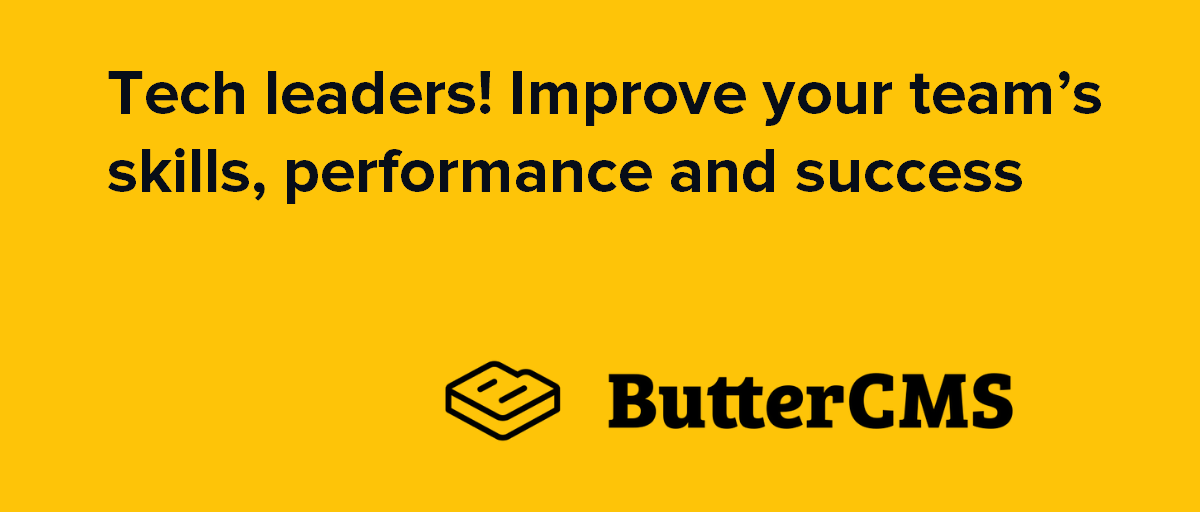
GSD
Tech leaders! Improve your team's skills and performance
Posted by Paweł Dąbrowski on October 20, 2023
Table of contents
Managing deadlines and delivering high-quality code and solutions is a hard part of a daily routine for every team leader or CTO. While accomplishing business goals is a critical aspect for the success of every project, we can’t forget that it is not possible without a dedicated team that is efficient and happy with the work they are doing. Especially these days, it is hard to keep your team motivated without extra effort.
To make this process a little bit easier, I prepared a set of rules that I found useful during years of working as a team member and leader. The rules are easy to apply for both standard and remote teams. The main goal of this article is to adopt new ways of helping team members grow professionally but also for leaders to benefit too.
IT companies: It’s time to change the rules
These days, being a team leader is no longer a single game of an experienced person whose main responsibility is to project manage and delegate. In the fast-changing technology world, listening is more important than speaking.
Always give feedback
Do not confuse feedback with criticism. There is no such thing as negative feedback. Quite on the contrary, feedback is always positive because it creates opportunities for growth. These general rules will provide valuable feedback that your team members won’t be afraid of:
- If something went wrong, tell it in four eyes - do not place anyone in a stressful situation by telling what they did wrong in front of other people. Nobody likes it and it shifts more on the negative feeling instead of the value of the information. If you want other members to be aware of the problem, ask the feedback recipient to prepare a quick note on how to avoid the given error in the future. Let the person feel that experience instead of correcting own mistakes.
- If something went right, tell it publicly - we like the feeling of appreciation, everybody does. Let’s celebrate each time there is a chance for this. Speak it loudly on the team meeting or standup call and then the person will feel motivated at no cost.
- If possible, always provide feedback face to face - it will make feedback more important and is a great foundation for future relations. When sending a simple message you won’t be able to see another person’s emotions and this is also very important. For some people, it is difficult to receive feedback and without seeing it there is no chance to work on this.
Always listen and welcome other people’s ideas
Even if you don’t need to collect ideas for a new feature or product update, encourage your team members to share their ideas with you. This habit will make them feel connected with the company and will motivate them to develop their skills. Don’t forget to write the ideas down. You never know when you will find them useful. It is also a good idea to create a public document where other members can write down their ideas and suggestions.
To encourage your team to share their ideas you can use the following ideas:
- Ask each team member to send you a list of topics in the given technology that they find interesting and exciting - from each member’s list pick some positions from current products and ask them to see if they see an area for improvements. This idea does not require any coding but will motivate developers as they will have a chance to look for an opportunity to play with the new solutions in the project.
- Suggest solutions but indirectly - even if you already found or see a possible solution for the problem, try to suggest it indirectly so your team members can come across the working solution by themselves. It will create an opportunity for you to show them your appreciation and you will control the whole situation from the beginning without risk of going in the wrong direction with searching for the right thing.
- Encourage team members to share their ideas for processes that don’t belong to their area of expertise - your developers may have some ideas on how to improve the business processes but they don’t have enough courage to share them with you. We tend to think that if someone is specialized in some area, their voice is not important in other areas. In many cases, a different perspective is the best way to find a proper solution especially if we are stuck in the place for many days in a row.
Encourage your team members to learn new things
It’s easy to fall into the trap of being locked into the world of doing the same things over and over again. It may happen especially if the project that you are working on is in the maintenance mode. But even if the number of features that need to be introduced is not exciting, there are plenty of things to learn. Here is why:
- Maintenance mode means time to cut costs - the product was delivered and you’ve got the first feedback from production users. It is a time to improve the server setup and correct initial assumptions that no longer meet the real-world conditions. Finding ways to improve the code using less external resources is hard and requires strong research and learning new skills.
- Paying technical debt requires creativity - if there are not so many deadlines it’s worth it to think about paying the technical debt. Refactoring the code always requires a creative approach and finding new, more elegant and efficient ways of solving old problems.
- Trying to depend less on external resources is also a good idea - although programming open-source libraries are an awesome addition to every program and application created with modern technology, we should not depend on them too much, especially if we are able to write our own solution. When you are preparing a product for the first release, time is the most valuable factor of success but when things are working as expected you can focus on creating more tailored solutions for your codebase.
Accept worse and unproductive days
It is not possible to always do the work at the highest level of performance and focus 100% on the work for the whole day. For many of us, it’s obvious yet we can get distracted especially when it comes to controlling other people’s work.
Try the following rules either to not fall into the trap of being too strict for your team members or being too indulgent:
- Always look at the larger perspective - it is easy to look at and measure the performance of a short period of time like a day or a week. Try to look from the perspective of one month. Look for the patterns. Maybe one of the team members is perfectly focused at the beginning of the week but is distracted at the end.
- Do not put everyone into the same box - we are different and it won’t change as we are doing differently even the same things. Do not compare others to the best person in the team but try to recommend good habits that will help other people to catch up during ineffective moments.
- Plan a lazy day with lower priority tasks - it is not always possible but it’s worth trying to plan one day to be lighter than the other days. It will help to catch a breath and get a fresh perspective for the few next days.
- Allow occasional work during the weekend - especially when you manage a remote team, it’s not always possible to work the full day as things tend to happen during work hours.
Trust and competence expansion
Don’t do everything by yourself because you will end up having tons of tasks even with the larger team. Instead of doing tasks, give instructions, offer support, monitor the results and show your appreciation. Let others gain new competencies and you will see how many things you can delegate making the whole team work faster. If you are not yet convinced or you find difficulty starting, you can follow these tips:
- Prepare the list of tasks that can be done by someone else - if you have to do something very often, most likely it can be delegated to someone else.
- Prepare the list of credentials or information that you have to provide in order to delegate the task - ensure that you collected all of the data needed to successfully perform a given task. You are now in the middle of the way to successful delegation.
- Prepare the detailed guide of how to perform a given task - Initially, time-consuming, writing down instructions will not only help to delegate the work but also to improve the whole process.
- Delegate the work gradually - don’t delegate everything immediately as both sides will get overwhelmed. Start with one task each week and improve the process if needed, measure the results and then move to the next step.
Delegating tasks is hard if you are a person that is responsible for the whole team and the final result. However, you will quickly notice that it’s beneficial not only for you but also for the person that you want to delegate new tasks too. Such a person will grow professionally, will be thankful for your trust and its self-confidence will be better.
Create a growth-friendly environment
Money is not always the first motivating factor. If the environment is not friendly, it’s hard to focus and perform on a good level.
Creating a friendly environment with space and support for growth is one of the most difficult things to do when business goals are waiting to be reached. If you are not sure yet how to create such an environment or transfer your current one, the following ideas may help you to do this:
- Schedule a feedback session on a weekly basis - schedule a one on one meeting with every member of your team. It does not have to take much time but it’s a great opportunity to talk and find out which processes are not working quite right and which rules are not needed or need to be improved. People feel better at work and are more likely to follow the rules if they are involved in the process of setting them.
- Create a FAQ document - it will be helpful not only for new members but also for other teammates to ensure they are following the rules or act appropriately
- Create space for non-work activities - if you are using tools like Slack or any other communication platform, it is a good idea to create communication rooms or channels that are not related to work. Let your team members share useful links, their thoughts or funny memes.
Developing skills is always a long-term game
Even if you are doing a great job by managing your team and delivering tasks before the deadline comes, you can’t forget that it’s a long-term game. It’s worth the investment of creating a space that is friendly and open for sharing ideas and feedback.
More importantly, creating a strong team connection will always result in a high-quality connection between your company and your clients.
ButterCMS is the #1 rated Headless CMS
Related articles
Don’t miss a single post
Get our latest articles, stay updated!














Paweł is a self-made writer of the digital era, IT samurai and problem solver who loves Ruby. He writes for human beings and computers at pdabrowski.com and focuses on soft skills in the software creation process.